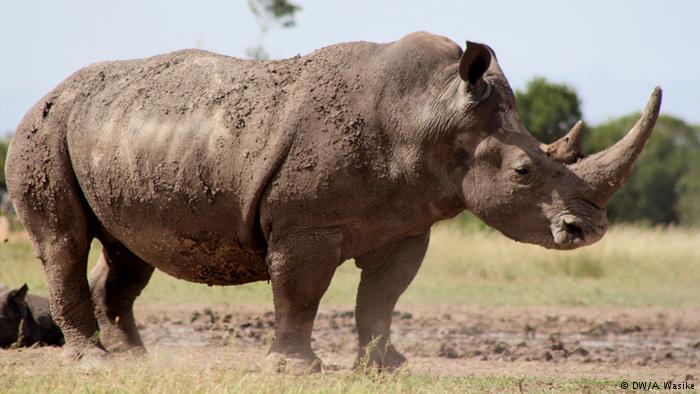Mozambique: INGD inaugurates weather warning system
Mozambique: Rhinos on the brink of extinction?

Southern White Female Rhino (DW / A. Wasike)
Poaching in Mozambique is driving the rhinoceros to the brink of extinction, National Conservation Areas Administration (ANAC) Director Mateus Muthemba has said in Maputo.
“More than 7,000 rhinoceroses have been lost in South Africa and Mozambique since 2008,” Muthemba said. “The few rhinoceros that try to cross to our side (from South Africa) do not survive the organised poaching gangs that operate here for more than 48 hours.”
260 rhinoceroses slaughtered in six months
Mozambique has a total of 54 hunting reserves and wildlife farms and 14 national parks and reserves, covering 25 percent of the national territory. These areas alone saw more than 260 rhinos slaughtered in the first six months of this year.
Other species are also being decimated, Muthemba explains.
“In five years, from 2013 to 2017, in the Niassa National Reserve alone, at least 65 leopards, 80 lions, 44 hyenas and 25 ‘babecos’ were killed using snares and traps in order to feed the illegal trade in the bones, nails and teeth of these species.”

Neither is elephant escaping the poachers. In March, the agency warned that Mozambique was losing elephants at a rate that, if not radically altered, would lead to the extinction, or at least to the unsustainability, of elephant populations.
Mozambique’s conservation areas are protected by more than 1,200 forest and wildlife rangers, about half what is considered necessary.
Rangers training
Muthemba was addressing a seminar on gathering evidence of environmental crimes.
In tandem with the reinforcement of surveillance, Mozambican justice institutions initiated a total of 1,255 cases related to environmental crimes between 2016 and 2018, including poaching and trafficking in flora and fauna products, illegal logging and mining.

Dozens of Mozambicans have been detained in neighbouring South Africa in connection with poaching, Muthemba said.
“In South Africa, up to July of this year, more than 65 Mozambicans have been sentenced to terms of imprisonment ranging from eight to 24 years.”
Lack of means in the fight against environmental crimes
The Mozambican state needs to mobilise more human and material resources to combat environmental crimes, including poaching and illegal fishing, the Agriculture, Economy and Environment Committee of the Assembly of the Republic of Mozambique recently said.
“The lack of technical, scientific and human resources limits our control and management of natural resources,” Francisco Mucanheia, chair of the commission, said in Maputo last week (08.08).
Giving a delegation from the International Foundation for Biodiversity Conservation an overview of the fight against environmental crimes in Mozambique, Mucanheia highlighted poaching and illegal fishing as major challenges for state institutions.
Mozambique, he pointed out, has abundant fauna and flora, and a long coastline.
Laws against environmental crimes
Mucanheia said that, at the legislative level, the country had taken important steps towards the adoption of laws to combat environmental crimes, including the criminalisation of offences that were previously only subject to civil sanctions.
Carolyn Weis, director of programmes at the International Foundation for the Conservation of Biodiversity, welcomed the fact that Mozambique had passed more effective laws against environmental crime, stressing the need for international collaboration against such offences.
“This is an area that has some challenges, but parliament has positioned itself to improve its ability to combat environmental crime,” she said.












Leave a Reply
Be the First to Comment!
You must be logged in to post a comment.
You must be logged in to post a comment.